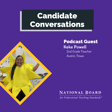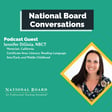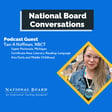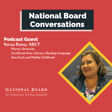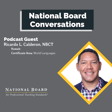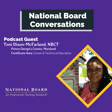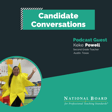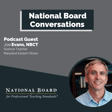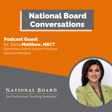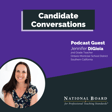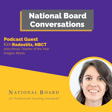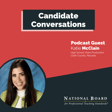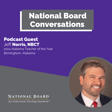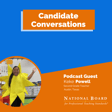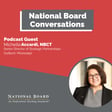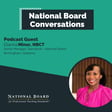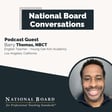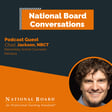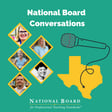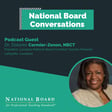Become a Creator today!Start creating today - Share your story with the world!
Start for free
00:00:00
00:00:01

Danny Hollweg
Danny Hollweg, a National Board Certified Teacher in Colorado joins National Board Conversations to discuss his blog post When Schools and Pixar Collide: The Value of a Postmortem.
Be sure to follow us on all our social media platforms to keep up with all National Board-related updates.
Twitter: @NBPTS
Instagram: @NBPTS
Facebook: The National Board for Professional Teaching Standards
Transcript
Meet Danny Hallway
00:00:00
Speaker
What's going on, everyone? On this episode of National Board Conversations, I speak to Danny Hallway. He's a National Board Certified Teacher in Loveland, Colorado. He recently wrote a blog for us on the standard discussing the value of reflection and having a post-mortem. We get into exactly what a post-mortem is, how we linked it to being an educator, and we get to learn a little bit more on Danny from a personal perspective. So without further ado, here's my conversation with Danny Hallway. Welcome, Danny. Thank you for joining the show. I'm glad to finally, you know, link together and get to meet you here.
00:00:29
Speaker
Eddie, thanks so much for having me, man. I've been looking forward to this all week long, so. Me too, me too.
Danny's Teaching Background
00:00:36
Speaker
So where are you currently and what's your current role in job?
00:00:39
Speaker
Yeah, right now I'm in northern Colorado. I teach high school English language arts, which is a run of things, right? So sometimes you got some sophomores in a class and an honors English class. Sometimes you're teaching creative writing. Sometimes you're teaching an AP lit class. And I'm also teaching a media literacy and publications course, which is kind of brand new. So we're still trying to sort of design that on the fly, but it's been a lot of fun. I think it's extremely important for
00:01:07
Speaker
Students to probably have three classes right now right it's like, you got to understand government and civics you've got to understand economics and maybe you should understand media literacy and how it's all working so that's. Seriously, like I went to journalism school and so um.
00:01:22
Speaker
that makes me happy to hear that part of school because I didn't get that in my school curriculum. And I got to see it in my high school after I left like the news literacy program and whole television journalism vocation came through. So it's nice that that's becoming a thing in schools there.
00:01:39
Speaker
Yeah, again, more reading and then it just got inspired but you know exactly what I'm talking about with being embedded with journalism is man it's just it's extremely important to be able to navigate it right now so I just going to try to help young adults be able to do that. So why did you become a teacher.
00:01:56
Speaker
Oh man, well, it's not the most romantic story, I think. I mean, the thesis really is, I kind of fell into it. I was studying English literature and language. It's where I was. I'd never really wavered from that. I started doing my grad work at Arizona State and I thought, okay, I'm going down this track and I'm going to probably end up in the teaching college range.
00:02:24
Speaker
But at some point, life hits you and you guys end up got to get a job, right? So you got to get a degree and then you just got to get a job. And it ended up being.
00:02:32
Speaker
education as far as public school. So I kind of had to go back a little bit to get my student teaching and get that practicum in and what have you, but I needed to make, I needed to make some money and start a career somewhere. So it was a public school that I started teaching at in Denver, Colorado. That doesn't even exist anymore, that poor school, but they built a nicer one and I think collapsed two schools into a really nice one down in Denver.
00:02:55
Speaker
And so for the last 15 years, I've been up here in Northern Colorado teaching. So that's how I sort of fell into it. Totally thought I was going to teach college. I'm kind of a geek about English lit and language and wasn't really strong in education. So I had to go back and relearn a lot of things to make sure I was going to be at least a competent public school teacher.
National Board Certification Journey
00:03:18
Speaker
Hey, and now you're a national board certified teacher. So when and why did you decide to pursue board certification? Yeah, that was a fun story. So I had.
00:03:31
Speaker
Maybe it was 2014, I think, and I was doing some work with the Bill and Melinda Gates Foundation, as well as the Colorado Education Initiative and Literacy Design Collaborative and Stanford scale and you meet all of these amazing people, all of these amazing facilitators, these amazing teachers that I work with in California or Louisiana or
00:03:52
Speaker
Kentucky, and still keep in touch with these folks right and some are San Francisco Giants fans I'm a Dodgers man so we talked beyond National Board as well. And, and when I started to meet these folks, I started to hear the buzz about National Board, I did not even know what it was in 2014.
00:04:12
Speaker
And I met this, who would soon be my mentor, this woman named Jessica. And it was another fellow teaching partner of mine. And we just started picking her brain about this. We were up in the mountains for sort of an educational retreat and listened to her for 30 minutes. And it wasn't that she was selling it. She was just really explaining it to us.
00:04:33
Speaker
And we kind of gotten in the mode of trying to figure out how to even start this process. My teacher partner and I, who since retired, God bless her, she went through her national board in her last five or six years of teaching. And so I think she's a champion for doing that too. We got together on a patio, I think maybe 2015.
00:04:54
Speaker
2014, 2015 and thought, can we do this? And the answer was no. Like we were just weren't ready. We didn't know how to navigate all of that. We saw the manual. We saw everything that would be for English language arts and young adult and adolescents and it was just.
00:05:10
Speaker
kind of tough. It was the following summer where we kind of committed and it was so necessary to have one Jessica who mentored us and had a cohort group down in Denver that we would join here and there. So I totally think you need other people just to bounce ideas off and just for that encouragement and just be in the same boat together rowing in the same direction, right?
00:05:32
Speaker
And thank goodness for my teaching partner, too. So we just pushed each other. And one of our mantras was if we're going to do this, we're going to lean in. We aren't going to revise anything. We are not going to fail the first time around. And we did. We looked at stuff. We read stuff from one another.
00:05:53
Speaker
We laid stuff out on tables in our classrooms, checked each other's work, make sure we had everything in the submission because everyone knows when you upload everything and then you got to finally hit the button, you're thinking, oh man, I hope I have everything and I hope everything's up to par and you got to wait the six or seven months behind it. So we did that in May of 2017 and
00:06:12
Speaker
clicked the button and tried to present our best work and our best videoing which was also a lot of fun and educational on that part from your own strategies. And by 2017, it was December 2017 and we both got conferred and we successfully passed national board certification and
00:06:34
Speaker
became master teachers in our state so and I just finished my maintenance of certification so I'll find out here in a month. Oh so you anticipated yeah uh December 11th so less than a month. So I'm I'm all about that too so I just finished that and I pressed that button in May again and we'll see how it all goes. Man this sounds like a like a both overwhelming and fun
00:06:58
Speaker
candidate experience? Absolutely. It was an experience. Man, Eddie, when you're in your first three years, you don't know what kind of teacher you are. When you're in your 10th year and you put in your Malcolm Gladwell 10,000 hours, you think you have it, right? I can manage a room. I can design a curriculum.
00:07:21
Speaker
do extra curricular stuff at school, I'm engaging, all of those things that you think makes a good teacher. And then I started working with those other groups that I had mentioned that the Gates Foundation and Stanford scale and such.
00:07:35
Speaker
And he thought, man, I still have a long way to go. And it's just about being reflective. And I was already kind of in that mode. And the National Board was on the stove. And when I went through that process, I learned that I wasn't great yet. I wasn't good yet. I could be a heck of a lot better
Continuous Learning and Growth
00:07:56
Speaker
for my students. I could be a heck of a lot more in the classroom.
00:07:59
Speaker
I could be a lot more to mentor teachers and younger teachers and be part of a mastermind group that kind of helps younger teachers in our profession, I just knew that I could contribute a lot more and I just wasn't there yet. And it doesn't mean that you have to be through national board to be a fantastic teacher it's not all what I'm saying but
00:08:18
Speaker
For me, it was this total vulnerability and understanding that, wow, I'm not there yet. After going through that process, I can't tell you that I'm perfect and I'm there yet, but I asked the right questions. We'll talk about what the book I was reading, and it's about asking and reframing those questions and asking those right questions going forward. That's, I think, really what National Board helped me do, is really think about who I wanted to be as a teacher,
00:08:48
Speaker
and where I was where I was going in my career and what the next day in the classroom was going to look like and continuously be flexible and continuously be able to learn myself along the way, which we need to do as teachers. Yeah, like exactly. It's very important. I mean, you brought it up. You wrote an art. You wrote a blog for us. We appreciate that when schools and Pixar collide, the value of postmortem of
00:09:15
Speaker
What got you to pick up the book in the first place and decide to compare it to your teaching? It was a run of nonfiction and suddenly I got into this whole run of
00:09:27
Speaker
reading CEOs and business people. I don't even know why I got there. I'm not in business at all, but I read Walter Isaacson's biography on Steve Jobs. And I was just curious in how Steve Jobs was working through a company and handling people. It led me to Bob Iger's book about Disney and his time as CEO at Disney called The Ride of a Lifetime. Led me to read Hastings' book about Netflix and the reinvention culture.
00:09:55
Speaker
And then I picked up Ed Catmull's 2014 book about Pixar. And I just kept, through all of that summer, I just kept thinking how each one of these books, these leaders, these facilitators who could really impact, all of these ideas could impact education on such a radical level. And
00:10:22
Speaker
I'm trying to build myself as a modernist teacher a little bit, a little more transformative, really taking risks. And so it was really refreshing to see and hear about these stories, about these multi-billion dollar companies, and sometimes on small, small levels in terms of teams working on really specific projects.
00:10:45
Speaker
you couldn't help but starting to write some things down that you learned from these guys. And the Pixar one was so much about creativity and how to manage really talented, creative, risk-taking people that it just seemed to so make sense about what we would want in education and how we want to talk to one another and how we want to encourage one another.
00:11:05
Speaker
to make the best show in the case of Pixar, but to make the best classroom, to make the best school, to make the best community as far as education goes. So it really was inspiring almost immediately. What do you think is the value of developing a post-mortem routine? Yeah, that post-mortem routine was really about reflection, right? It was really about
00:11:28
Speaker
Understanding lessons learned. I remember writing how I chuckled at the euphemism post-mortem.
00:11:36
Speaker
But this idea, which I think is really metaphorical with the national board process and journey too, about reflecting and about being in the moment and then immediately being able to take what you've gotten from kids or taking what you've gotten from a school year and how you can make that stronger and how you can make that better, right? So he's really going through those ideas of, hey, can we
00:12:01
Speaker
consolidate what we've learned. Well, I think at the end of the year, yeah, you want to be able to consolidate what you've learned, whether that is from your own class and trying to design a media literacy class, or if it's a program you put in at school, and you just have to spend some time reflecting on it. We can't fall into the trap of thinking, oh, it was a success, so it's going to be successful, and it's going to be, we're going to continue on that road.
00:12:24
Speaker
at the same time if it was a disaster doesn't mean it immediately needs to be ditched right it's the Winston Churchill line success is not final and failure is not fatal it's the willingness to continue so we want to keep thinking in those terms and that post-mortem was this
00:12:42
Speaker
Really guided way of saying, hey, let's get together. Let's try to teach each other, especially those who weren't there about what happened in the class or what happened in the school or what's going on with this program. So everyone is really on the same page, but at the same time, it's kind of hard. You really have to be vulnerable.
00:13:01
Speaker
in order to sit through a proper post-mortem, you really have to be open to, I want to say criticism, but you've got to be open to that feedback and you've got to leave the defensiveness aside and understand that it's not really the people, right? It's the process that we're really trying to make better. And that was the whole value of a post-mortem. Man, we just want to get better and have better teachers
00:13:27
Speaker
in a better place in the following year or have a better school or have a better district in the following year and you've got to be able to sort of force that reflection at times right he's got some really good lines about who wants to be second guest and it's human nature to not want to sit in a
00:13:46
Speaker
in a room, a conference room or on a patio and sort of go through, go through the nitpicking of it all. That's tough, you know, that's tough for a lot of people.
00:14:00
Speaker
Why do you, so you wrote, you like, and you wrote, and you talked about earlier, you like to work with others and collaborate with others and you think that's very helpful. What makes it helpful for you to have others like dissect your work and come at you? Yeah, one of the parts of the post-mortem
00:14:18
Speaker
is really trying to get others to understand your process and try to understand others' processes, particularly if you weren't there, right? And then try to pay that forward. So you're trying to really think about
00:14:38
Speaker
getting to really the detailed aspects instead of talking in general. When you're with a group, I had mentioned a mastermind group, which is John Spencer, AJ Giuliani thing, and trying to sit with other teachers, not so much to lament or groan about teaching or education, but it's really about to inspire and to motivate one another and to encourage one another. I sit with a group that
00:15:05
Speaker
has a seventh grade math teacher another group that another teacher has got a I think he teaches sixth grade English language arts and eighth grade English language arts PE teacher at the middle school level and I teach high school so none of us are even in the same school and
00:15:23
Speaker
What it allows you to do is also to try to share those ideas with one another to be able to sort of refine those ideas. Hey, it's the kernel of something. It's the genesis of something. And maybe these other four or five can help you sort of pan that out. And then it's kind of nice to
00:15:41
Speaker
another, you know, another month later go, well, how did that thing go? The other part of the reflection is in the post-mortem is to not let my own resentments fester. So if I'm in really in a post-mortem reflective moment with a team and we're thinking about a program or we're thinking about a project or, you
Collaboration and Reflection
00:16:03
Speaker
know, I've directed theater and you just kind of debrief about the theater show or what it needs before it launches that weekend.
00:16:10
Speaker
you want to get those resentments out. You can't be carrying that darkness with you. You can't be holding some things in because it's just not going to be helpful for you. It's not going to be helpful for the group. So when you are allowed those 10 minutes or 15 minutes to say, Hey, Danny,
00:16:28
Speaker
Go ahead and say your piece about this idea for a class or this idea for some aspect in education. You can get that out. They may not agree with you. It's not about me really persuading anybody, but I need to release that. I need to decompress. I need to make sure, well, hey, at least I have my voice heard.
00:16:49
Speaker
They honored me. They gave me the time to be able to do that. No one was interrupting me. It's really important part of that postmortem that I have that floor for 10 minutes if I want to take it and being able to just talk through my own personal experience and with it and how I see it going forward and my reasons why or why not. And then I can just let that go wherever it ends up. At least I've said my piece and I think that's really important. I think it's important for a lot of teachers. Let me let me get this out and then I can move on so.
00:17:19
Speaker
Yeah, and you brought up the importance of that in an article to make sure you let go of those resentments and disagreements. It's about the goal. It's not about what just happened. Absolutely. It's just everyone needs to be in a place where, OK, we talked about that. It's good. It's over. What's next, right? We always think about in terms of once we get the data back in a classroom or at the end of the year for school, we tend to think that the most important question is why.
00:17:49
Speaker
Well, why did all this happen? And that's not really it. The most important question is what's next? Once we've got all that, what are you going to do with it the next year? What are you going to do with it the next period? What are you going to do with it the next class? That's what really the, that reflective post-mortem style is going to help me at least personally be able to consistently ask, okay, so what's next for me?
00:18:11
Speaker
And that was the whole National Board thing too, right? Why do the National Board? Here it was. But it was about what was next after it. What was I going to do with it? How was I going to pay that forward? How was I going to contribute? And luckily, you guys let me write for you. I appreciate that. You wrote about the term successful struggle that you got from the book. How would you define that term for yourself and give it a little bit of a definition for the audience? Yeah, the National Board.
00:18:35
Speaker
It really is about lessons learned, right? Successfully struggling is to be open. And I had mentioned the word vulnerable, this concept of being vulnerable over and over again. And only then it's going to feel like it hurts, but it only hurts in the moment. Then when you reflect on what's been said or
00:18:55
Speaker
hey, man, that class did not go well, or, man, they did not do well on this assessment. I've got to, I'm not going to blame the kids, right? I've got to reflect on what did I do or what did I not do? How did I not scaffold? How did I not lay out an instructional ladder that may have been specific for that group? Because not all kids are, you know, not even all classes are the same. So when you open yourself up to that vulnerability,
00:19:20
Speaker
that's where that struggle hits. But it's successful in the sense that once the summer is passed, once you get back to redesigning, you know, I start designing classes again in July, typically when I start to get back at it and really think about my content and really start to consider what happened last year and look at my notes and look at my journal and start to move forward.
00:19:44
Speaker
That's when I know, okay, this next year is going to be more successful. I'm not going to try, at least I won't try to make the same mistakes, but before you can not make those same mistakes, you got to be aware of what those mistakes are. So that's where that, that successful struggle comes in. Did you learn the lesson? And if you didn't learn the lesson, you're still being that struggling moment. And if you've learned from it and can redesign, then it's a successful struggle.
00:20:10
Speaker
Oh, that's a little on the article. Everybody make sure you guys check it out. It's on our website. When school is in Pixar collide, the value of the postmortem. So one thing I like to move on, one thing I like to do here on this podcast is get to know our teachers a little bit outside the classroom because you guys are people too and you guys deserve to be known as regular folks.
Fun Personal Insights
00:20:30
Speaker
So first question right now we're gonna hit you with is what is your movie theater snack or choice?
00:20:35
Speaker
What do you want to know, Eddie, in the hard-hitting journalistic question? I love that question. It's so easy. At the same time, you're like, well, man, there's a lot in that glass.
00:20:49
Speaker
I'm a milk dud person, I think, which isn't always the most gracious when you're out on a date, right, with somebody because it's not enough. The beauty of podcast audio is, yeah, there's not enough in that box. And you get that sound. It's me chewing, you know, it's that
00:21:08
Speaker
What's going on? But yeah, The Milk Dead is the go-to, that golden box. Okay, okay. Recent pieces over here. Recent pieces probably not go to. That is a classic E.T. movie. All right, so who was your celebrity crush while you were in school?
00:21:29
Speaker
Her name is Alyssa Milano. Oh man, so my sister's named after her. Oh, okay. So yeah, it's a gorgeous name too. And Alyssa, I think, well, first of all, hi Alyssa. And Alyssa is a couple of years older than me, I believe. So when I was 15 and she was 17, man alive. But Alyssa still worked out those who's the boss days and just, yeah, just crushed at that moment.
00:21:57
Speaker
Oh, man. All right. Last one. Last one. What Jeopardy! category would you run the table on? The Jeopardy! category I would run the table on. I guess it's easy to just kind of default to the English literature stuff, right? If there's a category in hand, I can run it. But Zack Snyder, who's a director of films, has a run of films, right? Like 300 and
00:22:22
Speaker
Watchman, and Sucker Punch, and Man of Steel, and Batman v Superman, which is really kind of a piece of literature when you really start to read that movie, all three and a half hours of it, but it's actually really, really good. Listen, I used to write scripts and, man, three and a half hours script is crazy. Yeah, but if you gave me a Zack Snyder category, I might be able to make a really solid run, run at that. Yeah. Okay. Okay. I respect this different. I like it.
Conclusion and Blog Promotion
00:22:53
Speaker
We appreciate you taking the time to talk to me, Dan. This was so much fun. We'll definitely have to do this again if you write for us. I mean, we'll probably have you write for us again. I will definitely do this again. I am all about it. It's been a, it's been a great opportunity. And again, you know, starting interacting with people who have read the article or getting to meet a person like you and spending a morning. So this has been, yeah, this has been a real highlight of the month for me. So I really appreciate you guys giving me that moment and, and having me on this, the podcast, man.
00:23:23
Speaker
Oh yeah, no problem. One more. What are you bringing to Thanksgiving? What are you bringing to Thanksgiving dinner? I'm bringing myself. I'm actually on a road trip. And I said, look, I can swing by and grab some things. And they said, you know what? There's just going to be a chair for you. And so it might be some kind of beverage because I won't show up completely empty handed. But yeah, I think it's going to be a gathering of 15 people that I've got to think about bringing some kind of beverages for.
00:23:51
Speaker
That'd be nice. Well, thank you again for coming on. We'll definitely do this again and everybody make sure you go read. Check out Danny's piece when Pixar in schools collide. The value of the postmortem. It'll be linked in the show notes and we'll see you guys next time. Take care my friend.
00:24:07
Speaker
Danny dropping some Denver Nuggets all over the episode. I had a really good time talking with Danny discussing his recent blog post for us. Be sure to check it out. I'll link to it down in the show notes. I just want to thank him again for taking the time to talk with me and thank you for being a loyal listener to National Board Conversation. Be sure to follow us on all our social media and engage with us on your thoughts on potential topics you'd like to discuss on the show. This is Eddie Santiago signing off until next time. Goodbye everyone.
